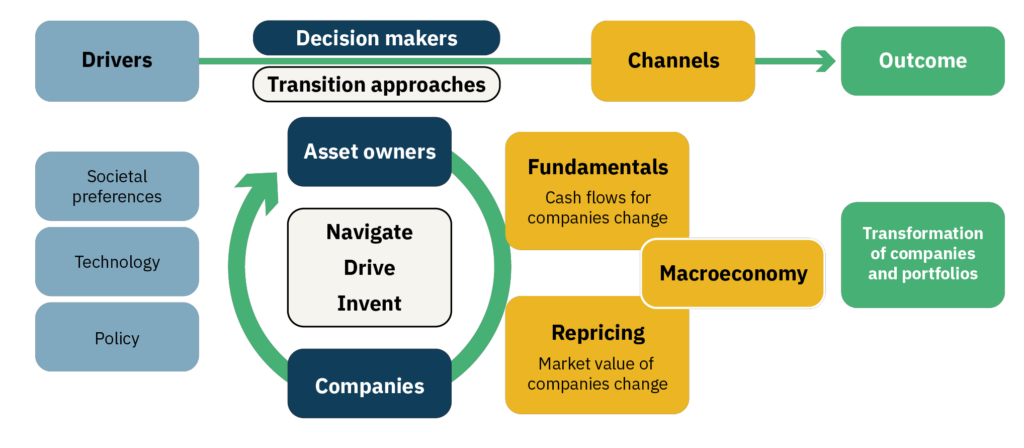In part 1, we explored how the world is grappling with the urgent need to combat climate change and reduce greenhouse gas emissions as the transition to a net-zero future has become an imperative undertaking.
To ensure global pledges and net zero targets are met, a convergence of key factors, each playing a pivotal role in accelerating the journey towards a sustainable and environmentally responsible global energy landscape, will be required.
Key drivers propelling the transition
Technological advancement is a key driver accelerating the transition to net zero, as prices plummet for renewables like solar, wind and batteries due to economies of scale and technology improvements. Powerful market forces also play a role, as investors increasingly favour low-carbon industries.[i]
Evolving social norms, especially amongst youth such as the climate strikes, are creating bottom-up pressure for climate action. And major policy developments like carbon pricing, clean energy incentives, and emissions trading schemes provide vital regulatory thrust. The combined forces of technology, economics, society, and policy are coalescing to foster decarbonisation.
Fundamental impacts on energy systems
Transitioning to net zero emission means we need to fundamentally transform how the world produces, delivers, and consumes energy. Entire systems must be redesigned to efficiently balance supply and demand from sources of renewable energy, while incentivising unprecedented levels of investment, estimated by McKinsey at $275 trillion cumulatively, in low-carbon technologies.[ii]
Energy-intensive industries like steel, cement and chemical manufacturing are likely to gradually relocate production to renewable energy hubs with very low electricity costs. This shift in industrial competitiveness will have profound economic impacts on communities and will require proactive ‘just transition’ policies to share the gains and minimise any hardships from job losses.
Navigating uncertainties in the transition
While the direction is clear, the path to net zero is continually evolving and filled with uncertainties. Technological limitations exist, from renewable seasonal intermittency (the inconsistent production of renewable energy due to seasonal weather impacting day light, wind strength, etc) to lack of long-duration energy storage solutions. Investment risks from shifting market dynamics may constrain private capital inflows.
Close collaboration between policymakers and industry is required to create the right market signals and investment frameworks. The International Renewable Energy Agency estimates the transition will require around $35 trillion in additional energy-related investments by 2030 [iii] – mobilising these funds is crucial.
Key players in the transition
Achieving net zero emissions will require coordination among various public and private stakeholders:
- Governments must set bold decarbonisation policies, incentives, standards, and interim targets. Carbon pricing and comprehensive energy transition plans are major policy levers.
- Corporations need to align business plans with science-based emissions reduction pathways and massively invest in green technologies.
- Financial institutions must screen investments for climate risks, restrict fossil project funding, and redirect capital flows into clean technologies.
- Citizens through individual actions and voting must drive urgent policymaker accountability to accelerate climate action.
- International cooperation is critical for technology transfers, knowledge sharing and optimising the global transition.
Transition in action

Challenges and trade-offs to overcome
The transition to global net zero emissions has multiple challenges and trade-offs to manage:
- Technology gaps like long-duration grid storage, advanced biofuels and heavy industry decarbonisation remain. Continued R&D, commercialisation support and innovation policies are crucial.
- Investment risks from shifting market dynamics may constrain private capital inflows. Public-private partnerships, incentives and public financing can share risks and attract investors.
- Policy inconsistencies across borders create uncertainty. International cooperation and alignment on regulations, carbon pricing and standards are essential.
- Social impacts on communities dependent on fossil fuels require ‘just transition’ policies to share gains and minimise hardships of job losses.
- Upfront costs will require enormous near-term public funding before long-term savings accumulate. Governments must step up on this budget challenge.
Conclusion
The transition to a net-zero future is a complex puzzle with countless pieces; with the key drivers and players, from technological advancements to evolving social norms and the critical role of governments, corporations, financial institutions, and citizens, all converging in this arena. The challenges and trade-offs are real, but the possibilities are promising.
In our third and final article in this series, we will explore the innovative solutions, actionable strategies, and the monumental role that the energy sector, powered by renewable sources, will play in shaping our sustainable future.
Sources:
[i] https://www.oecd.org/finance/Financial-Markets-and-Climate-Transition-Opportunities-Challenges-and-Policy-Implications.pdf
[ii] https://www.mckinsey.com/~/media/mckinsey/business%20functions/sustainability/our%20insights/the%20net%20zero%20transition%20what%20it%20would%20cost%20what%20it%20could%20bring/the-net-zero-transition-what-it-would-cost-and-what-it-could-bring-final.pdf
[iii] https://www.irena.org/News/pressreleases/2023/Mar/Investment-Needs-of-USD-35-trillion-by-2030-for-Successful-Energy-Transition and https://www.blackrock.com/corporate/insights/blackrock-investment-institute/publications/net-zero-transition
[iv] https://www.blackrock.com/corporate/insights/blackrock-investment-institute/publications/net-zero-transition


